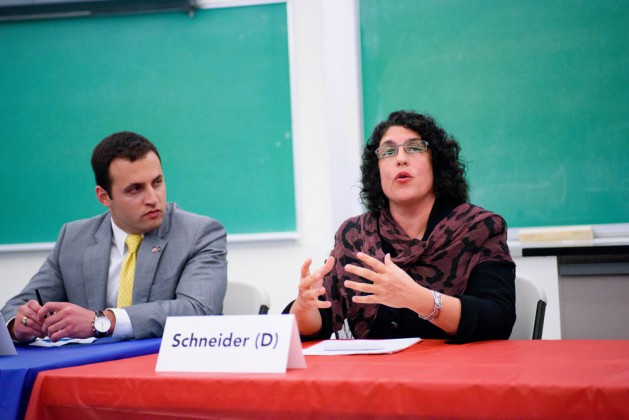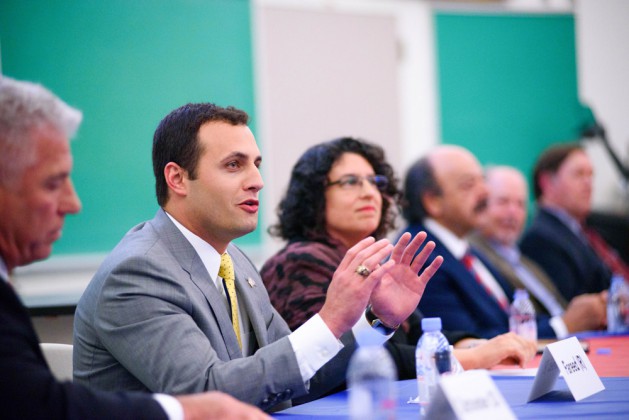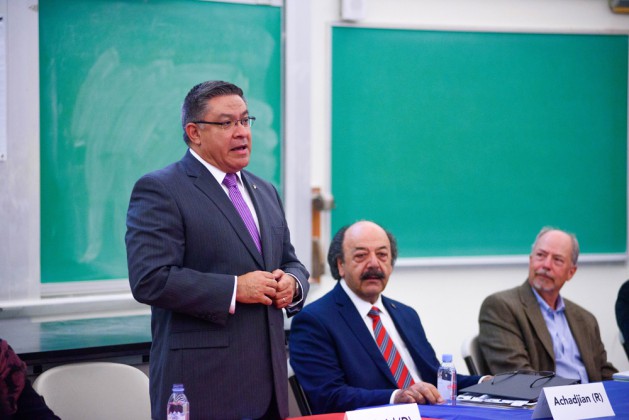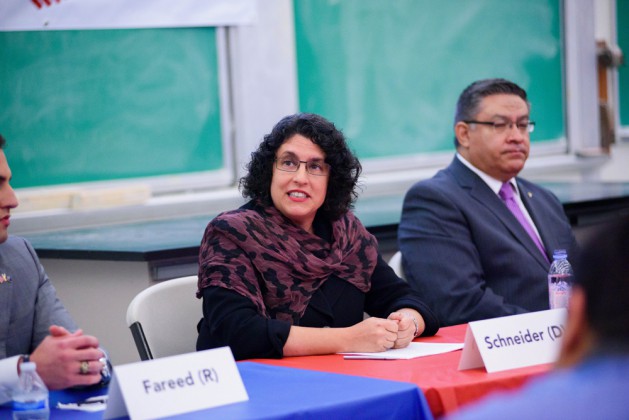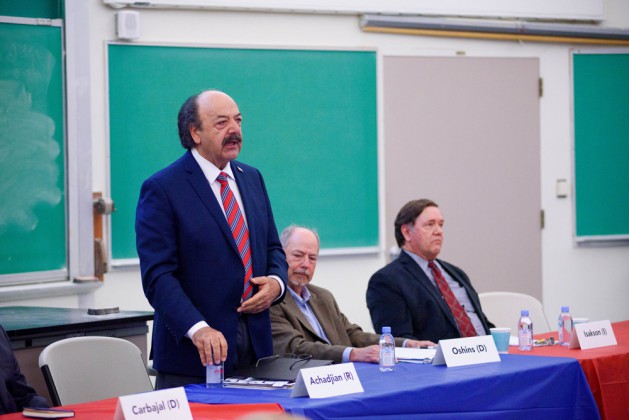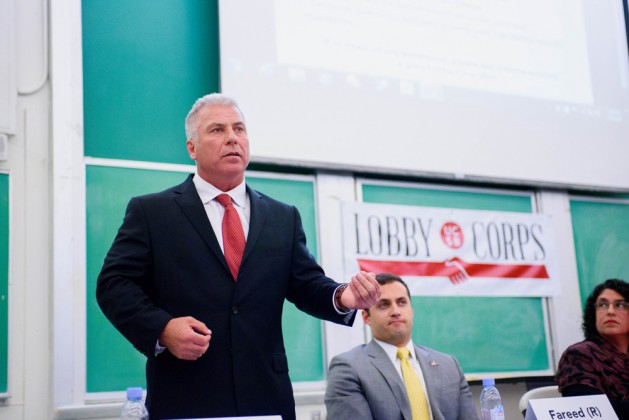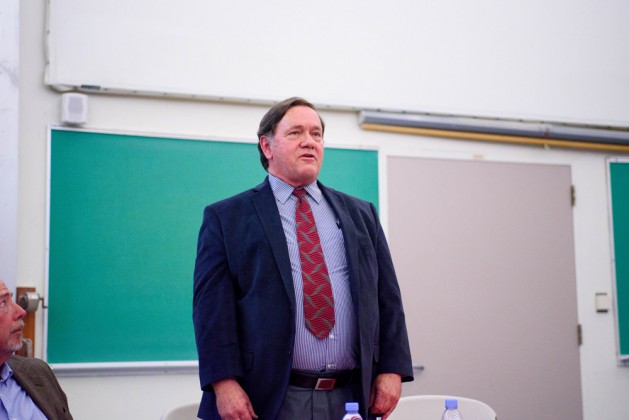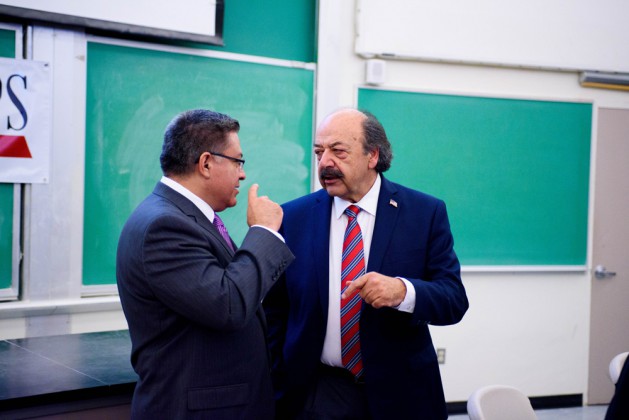Kelsey Knorp
National Beat Reporter
Student issues were central to Thursday’s congressional debate between seven of the ten candidates running to replace Rep. Lois Capps next term.
Democrats dominated the Mar. 3 discussion, with Santa Barbara Mayor Helene Schneider, First District Supervisor Salud Carbajal, farmer and businessman Bill Ostrander and insurance agent Jeff Oshins each present on the floor of the University of California, Santa Barbara’s Broida Hall. California Assemblymember Katcho Achadjian and businessman Justin Fareed fought for Republican appeal, while engineer Steve Isakson argued his case as an independent candidate.
The candidates offered a range of measures to address the issue of college affordability and loan debt at the federal level.
Frontrunner Achadjian supports both tax-free loans and tax-deductible accounts for family college savings, with the opportunity for unused funds to roll over from one child to another or be donated to university scholarship endowments. He also recommends increased federal support for facility expansion on university campuses to accommodate more students and promote timely degree completion.
“Having to work and put myself through college, and then having to help my children through college, I feel your pain,” said Achadjian, who left his family in Lebanon to pursue an American education in the early 1970s. “We need to pay attention, because you are the future.”
Carbajal’s plan centers around debt forgiveness, bolstered by restructured loan programs with lower interest. He proposes opportunities for college graduates to refinance their debt or work toward repayment through public programs.
Carbajal’s move to the U.S. followed not long after Achadjian’s, though much earlier in his life. The now-supervisor was just five years old when his father moved the family first to Arizona, then to Oxnard to pursue farm work. Like many first-generation immigrants, he was the first in his family to attend college.
“It’s a shame that you can refinance a mortgage, but you can’t refinance college debt [or] student loans,” Carbajal said. “We need to make sure that we’re expanding our opportunities for loan forgiveness for those that can work in the public sector.”
Schneider, now in her sixth year of mayorship, promotes access to loans for tuition, books and other college living expenses that arise throughout each student’s educational career. She distinguished herself from fellow candidates by inserting sexual safety as a factor crucial to positive university experience, highlighting her own allocations of funds to the Santa Barbara Rape Crisis Center.
“Where you put your money is where you put your priorities, and those are things at a federal government level we need to focus on,” Schneider said.
To this end, the Democrat wove several other issues into her response, from equal-opportunity employment and health care accessibility to gun control. The latter cause has drawn her attention for an estimated 15 to 20 years and is reflected in her 10-point plan to counter national firearm violence.
Like Republican rival Achadjian, Fareed seeks to expand family savings plans for college or alternative post-high school options, like vocational school or investment in a start-up.
“We need options moving forward to compete in the 21st century workforce, and make sure we have modernized government that is mobile and up-to-date with the time and with the circumstances that we all have as Americans and that we have as the future of our nation,” he said.
Fareed frequently appealed to his youth to draw contrast between himself and fellow candidates. At 27 years old, he could become the only sitting member of Congress under 30. A generational shift, in Fareed’s view, could prove key to resolving the dysfunction many Americans see as responsible for excessive taxation, job shortages and increased personal debt.
Ostrander comes from outside the political sphere as well, but spoke to the audience with the measured confidence of a longtime politician — perhaps because the San Luis Obispo local is no stranger to the public eye. His already diverse resumé includes work in sustainable farming, real estate development and a nonprofit for campaign finance reform.
He pointed to a 2014 bill by Massachusetts Sen. Elizabeth Warren that would have permitted students to refinance their unpaid loans at lower interest rates, citing it as an example of well-meaning legislation stopped short by political gridlock and corrupt campaign finance.
“And guess what? That bill was filibustered because there was nobody to oppose it,” Ostrander said. “Because students don’t have money to fund campaigns, or to push back or make consequences for people that vote against their interests.”
The candidate furthermore proposes a tax of one-fifth of one percent on each Wall Street financial transaction to fund higher education, noting a University of Maine study that suggests each dollar invested in a college student yields an average $7.46 return.
Soft-spoken Oshins dove into his four-point plan to tackle student debt, around which his platform is centered. Officials should drive down current loan interest rates — which he estimates at eight to nine percent — and allow students to consolidate a variety of publicly awarded loans, according to his argument.
The former congressional aide also hopes to expand opportunities for indebted graduates to declare bankruptcy instead of undergoing loan default, which can significantly damage credit in the long term. He recognized his slim chance of winning the 24th congressional district primary but hopes his message about college debt will stick regardless.
“I’ve chosen to stick on that issue because I’ve got my little moment in the sun here, running for Congress,” Oshins said of his candidacy.
Public service programs available to doctors and teachers for debt forgiveness should be expanded to include undergraduates, according to lone independent Isakson. He largely blames state funding cuts for prompting public institutions to raise tuition rates.
Republican candidate Matt Kokkonen, independent John Uebersax and Democrat Benjamin Lucas were absent from Thursday’s debate.
More than two dozen additional debates have so far been scheduled for the congressional candidates between now and California’s June primary, when it will be decided which two move on to the general election.
“This election is not about choosing between a Democrat or a Republican,” Fareed said. “This is about the vision that’s going to move us forward in a positive direction, and the status quo that’s been working against us and the direction that we’re headed.”
Update Fri., March 11 at 10:28 p.m.: Democrat Jeff Oshins has withdrawn from the 24th congressional district race, though he’s indicated plans to continue his work on student debt through alternative platforms.












